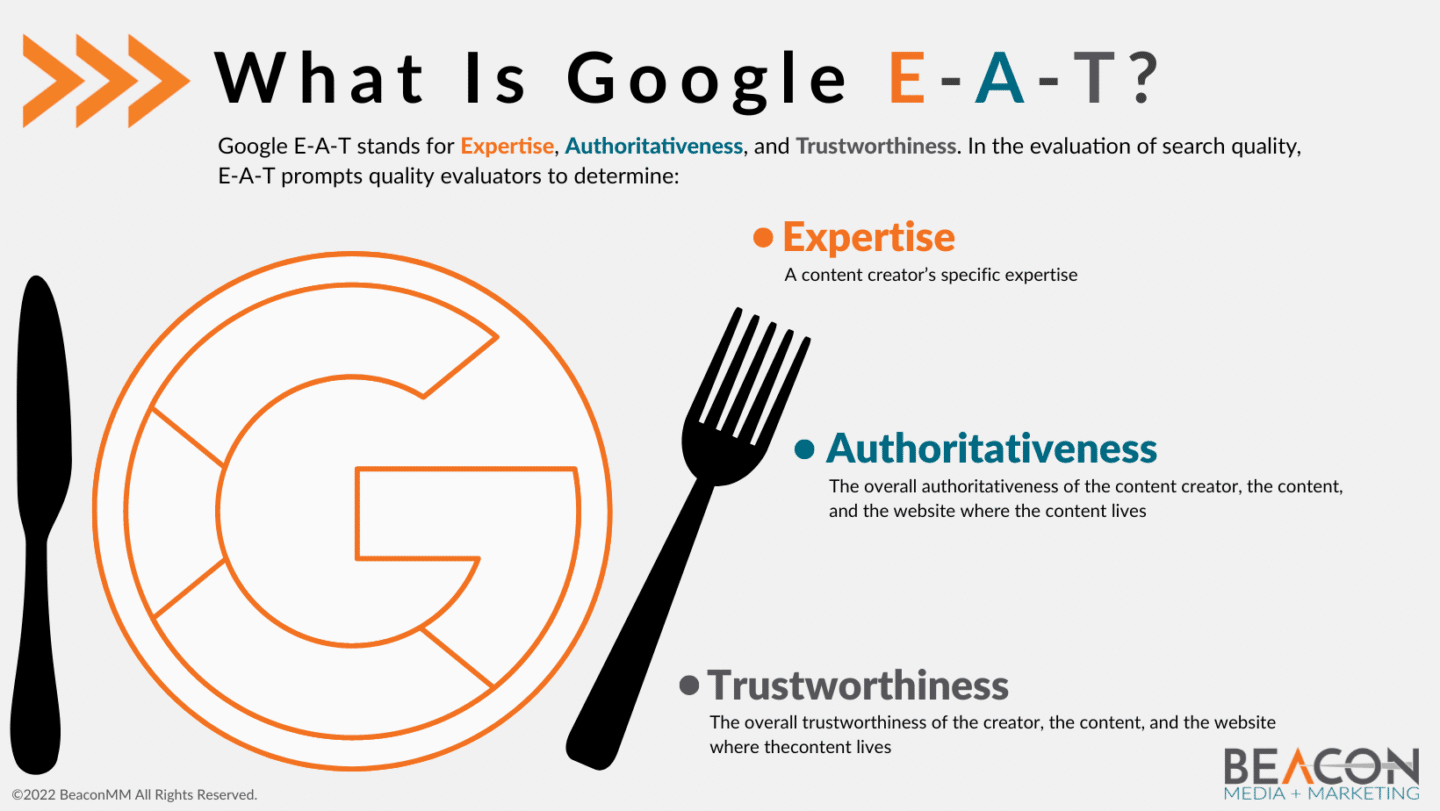We all expect a little bit of trust in the places that we choose to do business with. After all, trust is the foundation for authentic and positive relationship building. And the same holds true when people search for information.
Basically, in the same way that you’d likely be disappointed if you went to a hot dog stand only to find out that they only had chicken sandwiches, people are also getting frustrated when they search for specific terms and can’t find the answers they’re looking for. This is where Google E-A-T comes in. Because in the digital era, people want to know real facts and be confident that the content they read is trustworthy.
Without trust, it’s nearly impossible to grow your client base or your business. And as the world’s most prominent search engine with more than 8.5 billion searches per day, Google understands that users expect reliability when they use their service. So, if you’re serious about growing your business in 2023, understanding Google E-A-T is a great place to start.
Could your SEO strategy be better for navigating Google updates? Reach out to Beacon Media + Marketing today and schedule a free consultation.
What Is Google E-A-T?
The days of keyword stuffing have been over for a while. Even though some businesses still employ these shady practices, Google continues to penalize them in many ways. But today, especially with the proliferation of misinformation, the need for a greater level of authenticity and trustworthiness is more important than ever.
E-A-T, stands for Expertise, Authoritativeness, and Trustworthiness. First mentioned in 2014, E-A-T is part of a relatively recent update to Google’s algorithm that has become an integral part of Google’s search quality evaluator guidelines. At its most basic level, E-A-T gives Google a clearer picture in determining whether a specific piece of content is valuable to readers.
In the evaluation of search quality, E-A-T prompts quality evaluators to determine:
- A content creator’s specific expertise
- The overall authoritativeness of the content creator, the content, and the website where the content lives
- The overall trustworthiness of the creator, the content, and the website where the content lives
By determining these three factors of E-A-T, they will help to indicate if a piece of content is high-quality, valuable, and helpful for users and readers.
How Can Google E-A-T Impact the Ranking of Content?
If you think about it, would you rather get your information for marketing trends in 2023 from a site with authority such as Forbes, or from a private blog belonging to an unnamed person with no listed credentials? Basically, if you don’t even know who wrote the article, the value is going to be pretty low. And as a business that produces content, this makes it critical for you to have a healthy element of expertise, authoritativeness, and trustworthiness that both Google and your readers can place their confidence in.
Google understands that people want their service to be reliable. Otherwise, users will likely begin using another search engine. And obviously, this is the last thing that Google wants to happen. As such, without strong, authoritative content, the possibility of having your content ranked lower – or not even ranking at all – becomes much higher.
How Can You Improve Your E-A-T?
As mentioned, Google – and readers – want to know that what they’re reading comes from a reliable and trustworthy source. And this is where the power of creativity can be leveraged to improve your overall E-A-T.
Additionally, people love to see both a face and a name when they’re looking for answers. Instead of writing dry content without mentioning the author at all, implementing new practices that can highlight your E-A-T should be prioritized. And here are a few ways to do so:
- Interview real company experts and list their credentials within the content
- Offer content written, or ghost-written, by the CEO, CMO, or a director of operations
- Link out to the content creator’s LinkedIn profile
- Link to a bio of the content creator, or display an image of the creator along with his or her credentials at the bottom of the piece
Essentially, when creating content for your specific audience and looking to improve your E-A-T, you really need to begin with the foundational elements of marketing and ask a few simple questions:
- What do your clients care about?
- What questions are they asking?
- What information do your target clients want from you – before they reach out?
Your authority comes from understanding the answers to these questions, and your transparency – from actually showcasing and proving what you do. And this is done by giving examples in your content of how your company operates, identifying your process, showing how you get results for your clients, and highlighting specific case studies. Basically, don’t tell your audience what you can do, show them – and be able to back it up with proof.
In addition, your reputation and connections also play a major role. As such, other companies you’re aligning with and your community connections are also equally important to showcase. And this goes back to the basic principle of it being far more effective to have other people talking about you versus you talking about yourself.
How Can a Marketing Company Help to Elevate your E-A-T
A well-planned marketing strategy should play a key role when attempting to improve or enhance your overall expertise. But when attempting to increase your expertise, authoritativeness, and trustworthiness, you really need to dig in and understand a marketing company’s process before you decide to work with them.
Here are a few key questions to consider before working with a marketing company:
- Are they deeply researching the content that will be placed on your site?
- Are they interviewing the founders of the company and asking relevant questions?
- Are they outsourcing their content to AI?
- Are they outsourcing content production to experts in a specific field, or are they relying on content mills?
In considering these questions, you want to be sure that your voice is being highlighted, and that you’re not just producing content for content’s sake.
In addition, you also want to be fully aware of the process a marketing company employs when they develop content for you and ensure that they’re not taking industry shortcuts. And this is because Google will eventually penalize you for engaging in shady content practices, and your trustworthiness will correspondingly diminish as a result.
A marketing company can also enhance your brand awareness through the best utilization of imagery and web design. And at the end of the day, UX is a visual expression of a company on a website. For example, as over 80 percent of communication is non-verbal, the same holds true online. Essentially, it’s not all about the written words within the content, it’s how you present those words that make the greatest impact.
How can healthcare organizations get help with SEO for their websites?
Healthcare organizations seeking assistance with SEO for their websites have various avenues to explore. By following these strategies, healthcare entities can enhance their online presence and improve their ranking on search engine results pages (SERPs):
1. Seek professionals with expertise in healthcare SEO: Collaborate with experienced SEO specialists who possess in-depth knowledge of the healthcare industry. Look for professionals who understand the unique challenges and requirements of optimizing healthcare websites.
2. Optimize content with E-A-T in mind: E-A-T (Expertise, Authoritativeness, and Trustworthiness) is an essential aspect in healthcare SEO. Ensure that your website content is created or curated by individuals or organizations with credible medical expertise or accreditation. Present author credentials prominently to showcase their qualifications.
3. Focus on accurate and high-quality content: Developing valuable content is crucial for healthcare SEO. Craft informative and reliable articles, blog posts, and resources that address relevant medical topics and provide meaningful insights. Invest in creating engaging, well-written, and professionally styled content that resonates with your target audience.
4. Regularly update content for accuracy and relevance: To maintain E-A-T and sustain website rankings, regularly review and update your healthcare content. Ensure that information remains accurate, and reflect the latest medical advancements, guidelines, and research. Regular updates not only improve user experience but also signal to search engines that your website offers fresh and reliable information.
5. Consider linking to authoritative sources: Establishing credibility through relevant outbound links is essential. Include links to reputable and authoritative medical websites, healthcare organizations, academic journals, and trusted sources. This practice helps support your claims, enhances user experience, and signals to search engines that your website relies on trustworthy sources.
6. Avoid linking to low-quality websites: Prevent damaging your website’s reputation by avoiding associations with poor-quality or untrustworthy websites. Conduct due diligence in evaluating potential links, ensuring they come from reliable and credible sources. These proactive measures help maintain the credibility and authority of your healthcare website.
7. Collaborate with an SEO agency specializing in healthcare: Consider partnering with a reputable SEO agency that specializes in healthcare. They can offer customized strategies, technical expertise, and ongoing support to optimize your website for improved visibility, organic traffic, and higher rankings on SERPs.
By implementing these SEO strategies and seeking professional guidance, healthcare organizations can enhance their online presence, reach a wider audience, and effectively connect with patients and stakeholders.
Why is meeting Google’s guidelines important for maintaining a high-quality score and rankings?
Meeting Google’s guidelines is crucial for maintaining a high-quality score and rankings due to the significant impact it has on user experience and the potential consequences of misinformation. Google sets exceptionally high standards, particularly for healthcare websites, emphasizing the importance of expertise, authority, and trustworthiness (E-A-T). This is because information related to health and medical fields can directly impact a person’s happiness, health, financial stability, or safety.
Google’s Page Quality rating standards for Your Money or Your Life (YMYL) pages, including health sites, are particularly stringent. Low-quality YMYL pages have the potential to create negative outcomes for users, which is why Google places a strong emphasis on ensuring the content on these pages is of the highest quality. While manual ratings may not have a direct impact on rankings, algorithm updates are frequently based on these guidelines.
Non-compliance with Google’s guidelines can result in a low-quality score for a website, potentially leading to a decline in rankings. This, in turn, can significantly impact visibility in search results, reducing organic traffic and potential user engagement. Therefore, aligning with Google’s guidelines and producing content that demonstrates expertise, authority, and trustworthiness is essential for maintaining a high-quality score and achieving favorable rankings on the search engine.
What negative factors can impact a healthcare website’s reputation and rankings?
Negative factors that can impact a healthcare website’s reputation and rankings are as follows:
1. Poor-quality and unreliable content: Healthcare websites must ensure that their content is accurate, reliable, and up to date. Inaccurate information or low-quality content can decrease trust and credibility, leading to a negative impact on reputation and rankings.
2. Lack of expertise and accreditation: It is crucial for healthcare websites to have content developed by experts with appropriate medical expertise or accreditation. Websites should clearly display the credentials of authors or organizations to establish trust and authority.
3. Failure to adhere to E-A-T guidelines: Healthcare websites need to comply with Google’s Expertise, Authoritativeness, and Trustworthiness (E-A-T) guidelines. Failing to meet these standards can result in a negative impact on reputation and rankings.
4. Misleading or unclear information: Websites should provide clear and accurate information about the healthcare topics they cover. Misleading or unclear information can lead to a loss of credibility and trust, affecting the website’s reputation and rankings.
5. Negative online reputation: Having a negative online reputation, including negative sentiment or links from low-quality websites, can harm a healthcare website’s rankings. It is crucial for websites to actively manage their online reputation and cultivate positive recommendations and citations from reputable sources.
6. Poor user experience: User experience plays a significant role in website rankings. If a healthcare website has usability issues, slow loading times, or a lack of mobile optimization, it can negatively impact user satisfaction, leading to decreased rankings and reputation.
In summary, healthcare websites must focus on providing high-quality, accurate, and trustworthy content from recognized experts, adhere to E-A-T guidelines, cultivate a positive online reputation, and prioritize a seamless user experience to avoid negative impacts on their reputation and rankings.
How does a positive online reputation impact the quality rating of a healthcare website?
A positive online reputation plays a significant role in determining the quality rating of a healthcare website. According to Google, when assessing the reputation of a website, it is crucial to consider expert opinions and recommendations from reputable sources. This includes links or citations from professional societies and leading healthcare websites, as they serve as strong evidence of a positive reputation.
Google instructs evaluators to explore various sources online to gauge a website’s reputation. This includes looking for reviews, news articles, and credible information available on the internet. If a healthcare website has a positive online reputation, it is likely to be considered high-quality by Google’s evaluators.
On the other hand, a negative online reputation can have adverse effects on the quality rating of a healthcare website. If there is negative sentiment surrounding the website’s brand or business, Google may view it as a low-quality site. Additionally, if the website has numerous inbound links from low-quality sites categorized as “bad neighborhoods” (such as those related to pornography or gambling), its reputation will almost certainly suffer.
In summary, a positive online reputation greatly impacts the quality rating of a healthcare website. Expert opinions, recommendations, and credibility from reputable sources play a crucial role in establishing a positive reputation. On the contrary, a negative online reputation or association with low-quality sites can significantly lower the website’s overall rating.
How can healthcare organizations determine the amount of content needed on their website?
Determining the appropriate amount of healthcare content for a website is crucial for healthcare organizations. To do so, it is important to follow the guidelines set out in the Search Quality Evaluator Guidelines (SQEG). According to these guidelines, the E-A-T (Expertise, Authoritativeness, and Trustworthiness) of a page is a key factor in determining its quality. Hence, healthcare organizations should focus on satisfying Google E-A-T requirements in their content.
To start, it is recommended to carefully consider the purpose of each page before creating the content. This strategic approach to content creation is an essential part of an effective content strategy. It requires a dedicated team of marketing strategists and content creators who possess the necessary expertise and knowledge in the healthcare field.
While there is no precise answer to how much healthcare content is needed on a website, following technical SEO best practices can provide some guidance. Google emphasizes the significance of providing high-quality information that is factually accurate, clearly written, and comprehensive for health websites.
In summary, healthcare organizations must prioritize the E-A-T of their content to ensure its quality. By taking into account the purpose of each page, following technical SEO recommendations, and providing accurate, well-written, and comprehensive information, healthcare organizations can determine and deliver an appropriate amount of content on their websites.
Work With the Content Marketing Experts at Beacon Media + Marketing
At Beacon Media + Marketing, we’ve placed ourselves beyond the conventional practices and paths that often lead to industry shortcuts. And with our talented team of creative professionals, we can enhance your E-A-T and showcase the expertise and authority that your clients are looking for.
Are you ready to grow, thrive, get ranked higher, and show the world your expertise in 2023? Reach out to Beacon Media + Marketing and talk with an expert today.







